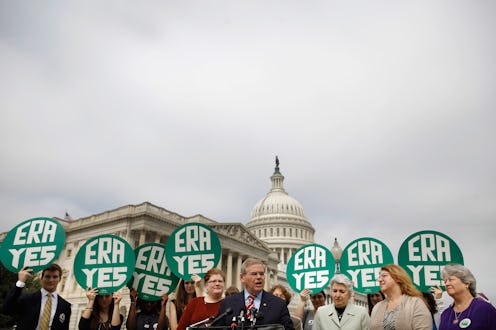Wednesday is Women's Equality Day, marking the 95th anniversary of when American women finally received the right to vote in 1920. And yet, more than 90 years after the introduction of the Equal Rights Amendment, total gender equality is still not protected by the Constitution. The ERA has experienced numerous hurdles — from conservative opposition in the form of Phyllis Schlafly to a shortage of ratifying states — and as a result, has still not become the 28th Amendment to the Constitution. What this means is that now, more than ever, it is absolutely vital that we continue to fight for the ERA by working to help pass the Equal Rights Amendment in your state.
It is important to note that 20 states have passed their own version of the ERA. But the history is important here. When the ERA was sent out to the states for ratification in 1972, only 35 of the required 38 states ratified it by the 1982 deadline. Now, more than 30 years later — due to a combination of lack of momentum and ratification deadlines imposed by Congress — the ERA still hasn't achieved the required ratification count. But there are numerous ways to join the fight to add the ERA to the Constitution; here's what you can do.
Find Out Whether Your State Has Passed The ERA
There are two different elements at play here: The first is whether or not your state has passed a version of the ERA at the state level, and the second is whether or not your state has ratified the national ERA. Twenty states adopted state-level equal rights amendments between 1879 and 1998. Some of these amendments closely resemble the proposed national ERA, while others are more similar to the 14th Amendment.
But as we fight to get the ERA added to the Constitution, we should simultaneously be paying close attention to states that haven't yet ratified it at the national level. The Equal Rights Amendment website lists the 15 states that have yet to ratify the amendment, and also provides a map that shows which states have already done so. Since 1995, ERA bills have been introduced in nine of these 15 states, in an attempt to pursue the "three-state" strategy that calls for the addition of the amendment to the Constitution as soon as three more states ratify it.
Write To Your Representatives & Senators
According to Democratic Representative Jackie Speier, 70 percent of people polled think that the Constitution already has an Equal Rights Amendment, and it often comes as a shock to those who learn that it doesn't. We need to remind people that this is still an ongoing struggle, and part of that struggle is writing to or calling Congressional officials and making it clear that the ERA still matters to us. The U.S. House of Representatives website makes it easy to find out who your representative is, and the U.S. Senate website lists the two senators for each state. Get into contact with them — we need to hold our politicians accountable in the fight for equality.
Sign A Petition
Many prominent media figures and entities, from celebrities and politicians to civil rights organizations, have put their full support behind the ERA — and you can, too. Join the ERA Coalition and take their pledge "to end economic discrimination and violence against women and to promote equality for all women."
You can also sign this petition on MoveOn.org or this one from CREDO Action. There was also a petition to push for the ratification of the ERA on the White House website back in 2013, but that petition has since closed — you should read the the official White House response to this petition, which states that "We'll keep fighting to close the wage gap and ensure equality of rights under the law for all Americans." Two years later, we still don't have an ERA, so clearly, the fight must continue.
Raise Awareness On Social Media
Social media might be addicting — and often toxic — but it is also powerful. Share your thoughts and pertinent literature under the #WomensEqualityDay and #EqualRightsAmendment hashtags to highlight the ongoing battle to add the ERA to the Constitution. Tweet at politicians and organizations to emphasize your support for the ERA, and ask them to join the fight while celebrating those who have already done so.
If we take action, and don't remain complacent, then we can get the ERA passed. Alice Paul, who co-wrote the ERA, once described a possible future in which "they will be celebrating the 150th anniversary of the 1848 Convention without being much further advanced in equal rights than we are." It has been more than 150 years since 1848, but that doesn't mean we have to stop fighting for the future that Paul and other feminists throughout history worked for.
